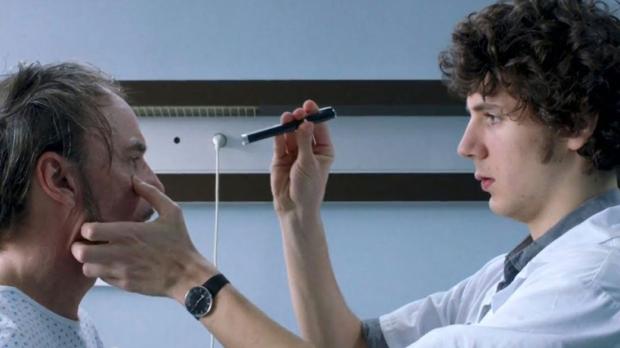Hippocrates: Diary of a French Doctor
In Thomas Lilti’s Hippocrates: Diary of a French Doctor, a TV set in a hospital is tuned to the medical drama House starring Hugh Laurie as a witty, irascible, and brilliant doctor. This urban medical center is a little realm far removed from the incisive medical problem solving of the TV show. In this Paris hospital, most doctors and nurses try to do their best for patients under sometimes very trying circumstances.
And it’s in this stressed facility that Benjamin Barois (Vincent LaCoste) is beginning his internal medicine internship as the movie opens—in a stained white tunic two sizes too big. (“Perfect,” proclaims the uniform clerk.) The movie’s title is a little misleading: It does follow Benjamin’s experiences in this facility but the movie’s focus is broader and the material has more facets than the title seems to suggest. Unlike the remarkable, incisive resolutions to problems on shows like House, Benjamin—who looks too young to be a patient, let alone a doctor—is going to be involved in messy, unsatisfactory, and even tragic situations. He won’t emerge from this training unscathed, physically or emotionally. It’s all part of his training, the movie seems to imply. Much of Hippocrates comes off as sharply involving melodrama, but it’s almost always intelligently created. There’s emotion—sometimes high-pitched—but sentiment is kept at bay until the very end.
Benjamin’s relatively privileged situation (his father is chief of service) is contrasted with that of a slightly older intern, Abdel (Reda Kateb), an Algerian practitioner trying to quality for a French license. Abdel will save Benjamin’s bacon soon enough, and he in turn will inadvertently place the Algerian in a very threatened position. Abdel is highly skilled and deeply empathetic to the patients. In a way, he becomes not only Benjamin’s conscience, but the picture’s.
Lilti’s direction is tempered and smooth; he doesn’t push the drama so much as let it accrue, allowing the audience to experience it with the characters. The performances are likewise expertly modulated.
The picture may be about Benjamin’s professional and personal coming-of-age, but Kateb’s Abdel may resonate with audience members afterward. As well as the movie’s perceptive, sobering, and sometimes moving examination of life on a medical front line.

